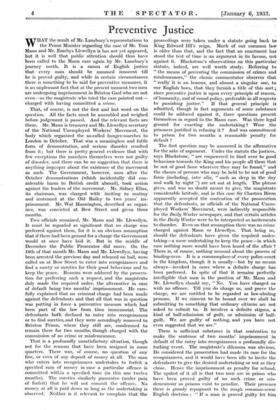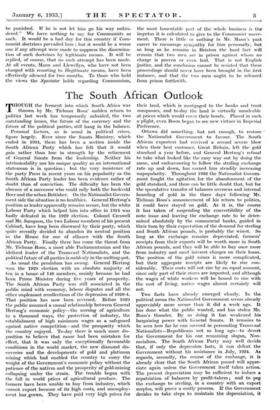Preventive Justice
WHAT the result of Mr. Lansbury's representations to the Prime Minister regarding the case of Mr. Tom Mann and Mr. Emrhys Llewellyn is has not yet appeared, but it is well that public attention should thus have been called to the Mann case again by Mr. Lansbury's journey north. It is a canon of English justice that every man should be assumed innocent till he is proved guilty, and while in certain circumstances there is something to be said for preventive measures, it is an unpleasant fact that at the present moment two men are undergoing imprisonment in Brixton Gaol who are not even—as the magistrate who tried the case pointed out— charged with having committed a crime.
That, of course, is not the first and last word on the question. All the facts must be assembled and weighed before judgement is passed. And the relevant facts are these. Mr. Mann is treasurer and Mr. Llewellyn secretary of the National Unemployed Workers' Movement, the body which organized the so-called hunger-marches to London in October. That Was a meaningless and futile form of demonstration, and serious disorder resulted from it; but there is pretty general evidence that with few exceptions the marchers themselves were not guilty of disorder, and there can be no suggestion that there is anything improper about the existence of the movement as such. The Government, however, soon after the October demonstrations (which incidentally did con- siderable harm to British credit abroad), took action against the leaders of the movement. Mr. Sidney Elias, its chairman, was charged with inciting to mutiny and sentenced at the Old Bailey to two years' im- prisonment. Mr. Wal Hannington, described as organ- izer, was convicted at Bow Street and given three months.
Two officials remained, Mr. Mann and Mr. Llewellyn. It must be regarded as significant that no charge was preferred against them, for it is an obvious assumption that if there had been ground for a charge the Government would at once have laid it. But in the middle of December the Public Prosecutor did move. On the lath of that month Mr. Mann and Mr. Llewellyn, having been arrested the previous day and released on bail, were called on at Bow Street to enter into recognizances and find a surety or sureties for their good behaviour and to keep the peace. Reasons were adduced by the prosecu- tion for preferring such a request, and the magistrate duly made the required Order, the alternative in case of default being two months' imprisonment. He care- fully explained that no criminal charge had been made against the defendants and that all that was in question was putting in force a preventive measure which had been part of the law from time immemorial. The defendants both declined to enter into recognizances or to find sureties, and they were accordingly removed to Brixton Prison, where they still are, condemned to remain there for two months, though charged with the commission of no crime or misdemeanour.
That is a profoundly unsatisfactory situation, though not for the reasons that have been assigned in some quarters. There was, of course, no question of any fine, or even of any deposit of money at all. The man who enters into recognizances undertakes to forfeit a specified sum of money in case a particular offence 'is committed within a specified time (in this one twelve months). The sureties similarly guarantee (under pain of forfeit) that he will not commit the offence. No money at all is paid down so long as the undertaking is observed. Neither is it relevant to complain that the
proceedings were taken under a statute going back to King Edward III's reign. Much of our common law is older than that, and the fact that an enactment has stood the test of- time is an argument in its favour, not against it. Blackstone's observations on this particular statute, indeed, are well worth study. Referring to "the means of preventing the commission of crimes and misdemesnors," the classic commentator observes that "really it is an honour, and almost a singular one, to our English laws, that they furnish a title of this sort ; since preventive justice is upon every principle of reason, of humanity, and of sound policy, preferable in all respects to punishing justice." If that general principle is admitted, though in fact arguments of some substance could be adduced against it, three questions present themselves in regard to the Maim case. Was there legal ground for exacting the undertaking ? Were the prisoners justified in refusing it ? And was commitment to prison for two months a reasonable penalty for default ?
The first question may be answered in the affirmative for the sake of argument. Under the statute the justices, says Blackstone, "are empowered to bind over to good behaviour towards the King and his people all them that be not of good fame wherever they may he found," and the classes of persons who may be held to 'be not of good fame (including, inter alia, "such as sleep in the day and walk by night ") are set out at length. The phrase gives, and was no doubt meant to give, the magistrate considerable latitude, and in this case Sir Chartres Ekon apparently accepted the contention of the prosecution that the defendants, as officials of the National Unem- ployed Workers' Movement, were indirectly responsible for the Daily Worker newspaper, and that certain articles in the Daily Worker were to be interpreted as incitements to disorder. Even on that assumption there was no crime charged against Mann or Llewellyn. That being so, should the defendants have given the required under- taking—a mere undertaking to keep the peace—in which case nothing more would have been heard of the affair ? There is, of course, nothing unusual about the process of binding-over. It is a commonplace of every police-court in the kingdom, though it is usually—but by no means always—invoked in cases where a definite charge has been preferred. In spite of that it remains perfectly intelligible that men in the position of Mr. Mann and Mr. Llewellyn should say, "No. You have charged us with no Offence. Till you do charge us, and prove the charge, we are entitled to be regarded as law-abiding persons. If we dOnsent to be bound over we shall be submitting to something that ordinary citizens are not asked to submit to. It involves a definite stigma, a kind of half-admission of guilt, or admission of half- guilt. We are guilty of nothing, and you have not even suggested that we are."
There is sufficient substance in that contention to make the sentence of two months' imprisonment in default of the entry into recognizances a profoundly dis,. turbing event. The magistrate's dilemma was obvious. He considered the prosecution had made its case for the recognizances, and it would have been idle to invite the defendants to give the desired undertaking or not as they chose. Hence the imprisonment as penalty for refusal. The upshot of it all is that two men are in prison who have been proved, guilty of no such crime or mis- demeanour as prisons exist to penalize. Their presence there is grossly repugnant to the rough common-sense English doctrine : "If h man is proved guilty let him
be punished. If he is not let him go his way unhin- dered." We have nothing to say for Communists as such. It would be a bad day for this country if Com- munist doctrines prevailed here ; but it would be a worse one if any attempt were made to suppress the dissemina- tion of such doctrines by legitimate means. It will be replied, of course, that no such attempt has been made. At all events, Mann and Llewellyn, who have not been charged with resorting to illegitimate means, have been effectively silenced for two months. To those who hold the views the Spectator holds regarding Communism,
the most lamentable part of the whole business is the impetus it is calculated to give to the Communist move- ment. There is little or nothing in Mr. Mann's past career to encourage sympathy for him personally, but so long as he remains in Brixton the hard fact will remain that two men are in prison against whom no charge is proven or even laid. That is not English justice, and the conclusion cannot be resisted that these proceedings should never have been brought in the first instance, and that the two men ought to be released from prison forthwith.





































 Previous page
Previous page